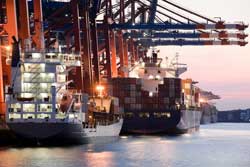| |
Issue 11 : August 2012 |
| So another rather long gap between newsletters, driven by the intensity of work! What recession, no recession for this company. At present our thoughts are moving around how to think smarter and be more effective as a company, Carolyn has been bringing some focus and brain research into this process and provides some insight in this newsletter. Stimulated by some of the more honest discussion in the press about real return on container shipping from the chief executive of Maersk there are also some comments on competition and consolidation (or lack of it) in container shipping. That led us into thinking further about the benefits of cooperation between ports and terminals. Drop in a few observations on Consultants and corruption and we hope you find our latest newsletter interesting if not enjoyable. As always, it will be good to get your feedback on our opinions and comments in this newsletter, just contact me on [email protected] |
 |
|
Are You a Thinking Company? (Carolyn Wignall)
 |
|
Dr. David Hyerle suggested that if you give students a thought they will learn for a day, teach them how to think and they will learn for a lifetime. You need to think to learn and need to learn to think. After two days running ‘How to Create a Learning Focused School’ in Indonesia, I have been reminded about the significance of learning in the business world.
Learning is an individual process that means we are open to new ideas and the world of possibilities. Unlike many of our children many adults in the business world seem to not understand, care or have consciously thought about how they learn. Very often we see a preference for the status quo and unwillingness to change. The larger the company, the more often the inertia of thought is apparent. |
Why are so many frightened by change? Is it because we perceive that things staying the same is an easy option, no one can ever be wrong for doing the same as was done last time! We are OK as things are, our company is doing well there is no need to change. Ignoring the fact the world around us seems to change at an ever increasing pace. Or, is it because companies, managers and individuals underrate how thinking and learning can be exciting, worthwhile and motivate people far more effectively than money?
After careful scientific research Art Costa identified 16 intelligent behaviours that promote thinking and learning. They are:
- Questioning and problem solving
- Gathering data through all the senses
- Remaining open to continuous learning
- Persisting
- Striving for accuracy
- Listening with understanding and empathy
- Thinking and communicating with clarity and precision
- Thinking about thinking (Metacognition)
- Managing impulsivity
- Applying past knowledge to new situations
- Thinking interdependently
- Responding with wonderment and awe
- Thinking flexibly
- Taking responsible risks
- Creating, imagining and innovating
- Finding Humour
Be Honest, how many of us have consciously thought about using these intelligent behaviours to improve our own learning or the learning of our employees? Even if we are conscious of them are we aware of the benefits?
Why is it that teachers quickly see the benefits in promoting these aspects of thinking, and want to learn ways to do this, yet businesses often neglect the importance of developing a culture of thinking and learning? Even if a business sees the need for change the constant search is for how to innovate, the right idea and workshops and off sites to wonder how this can be done. Surely the answer is obvious; a business can develop a culture of thinking and learning in exactly the same way it can be done in a forward thinking school. That is no easy process. No simple two day workshop. Let us face it, adults need more time to leave their comfort zones and be convinced about new approaches. New approaches need to be slowly grown into the system. As people learn to see the benefits of early changes, they become more willing to make further changes.
So, where is the starting point for learning in a business? It starts with right relationships within the potential team. We are social beings who need connection with each other. Our brains work by making connections and a company needs to develop a collective brain. Employees need to relate to each other and recognise each other’s different thinking styles and potential to contribute to a common cause. A common cause needs negotiation and the opportunity to appreciate different points of view. This process will take time and effort. A wise leader takes the time to cultivate the right culture, and establishes where the employees are at so that learning and progress can start from there. As individual goals and agendas are recognised a company approach can be promoted. It becomes a learning organisation with all the potential a collective brain can bring. Satisfying and successful work is more than just a pay check!
Container Cartels, Antitrust Exemptions and the Future
How can an industry and its analysts forecast a rise in freight rates when there is clear and considerable overcapacity within the industry? That is a question that should be asked every time the subject of antitrust exemptions is raised. The answer you often hear on freight rates, in the analysts’ discussions even, is about capacity management and the withdrawal of capacity from the market. So, in sector analysts’ reports we have almost a smoking gun.
| The management of capacity is being used, if not to raise rates certainly to stop a continued fall. While some container lines are doing less badly than others, no true winners and losers are emerging. There are few bankruptcies, little consolidation; no blood bath in the sector. Some, but not all, of this can be explained by Government actions. Many may come to the conclusion that more of it is explained by coordinated action to manage capacity in some key trades. This conclusion is helped when you see reports from “experts” predicting |
|
 |
that capacity will be tight in a couple of years because of actions taken by alliances. As more and more come to that same conclusion, it is surely only time until the appropriate investigators take an interest. Then, the container sector could be worrying about rather more than losing specific exemptions for the operation of Alliances and Conferences in jurisdictions across the world. The steady erosion in Europe and the US, wavering in some Asian jurisdictions will be the least of their concerns. To consider what can happen go and read some of the history of the antitrust actions against Jo Tankers, Odjfel and Stoldt in the parcel tanker sector in the US. Or for that matter the domestic container trades in the US. How many went to prison and for how long?
Cooperation and/or Competition Between Ports
 |
|
Should ports and terminals compete or cooperate? What value can be created by cooperation between ports? How much value is created for the wider economy when terminals compete for traffic in terms of service and charges?
Looking for answers to these questions we could look to the performance of some of the large container terminal |
operators. How much do they benefit from having many terminals operating across the world? What value does the scale of their businesses provide? This is a far more direct measure of the benefit of cooperation than the less structured cooperation we often see between ports at conferences and in exchanges etc...
It seems obvious that they benefit from the scale of their purchasing, for example the purchasing of major container handling equipment. Buying ten cranes a year gets you a better deal per crane and rather more "pull" with the supplier after delivery. There are probably benefits from a pool of skilled managers and the ability to offer an interesting career progression through terminals across the world.
Beyond these are there other clear and obvious advantages? Which of these advantages do not have counterbalancing disadvantages?
You may be able to get better deals on the cranes, but do you lose from tying yourself into one supplier and losing the broad range of smaller sub-systems suppliers close to your terminal? Is the price being traded, for flexibility?
The traveling managers do not form truly long term relationships with the workers in the terminals. Workers see a group of managers to which they find it hard to aspire. Terminal teams’ and localized teams’ knowledge about their terminal, their equipment are sacrificed. A thought, without going to specific terminals and getting into trouble over confidentiality I will find it difficult to prove. But, search your own knowledge perhaps my point can be taken further from that source!
So on the cooperation side we have a case, perhaps, unproven. There are benefits. But for any benefit there is potentially a cost beyond the direct one paid to airlines, hotels and conference organizers. In the next newsletter we shall look at the value created by competition. Mainly this is postponed till next time because we are already far beyond the nominal word limit for this newsletter!
The Use of Consultants, Large and Small, Capable and Incapable...
I have always seen consultancy as a personal business. A business based on trust and confidence. A client needs to trust his advisors and that requires you to know them personally. Why then do I so often come across situations where good companies appoint consultants because of their brand and not the individuals to be employed on the work required? The use of consultants to take responsibility away from the manager concerned is often quite evident in the process of bid and appointment.
| At times some of the big Management Consultancies talk to me about how to structure bids for “culture change” or “performance improvement” and it becomes obvious fairly quickly that what they are seeking is how to customize the presentation of their tool box of ideas, methods and approaches to the needs of their client. What they are not trying to do is understand the needs of their client and develop methods and approaches from first principles that actually address |
|
 |
the client’s situation. That would in effect be too costly; profit is generated by scale and repetition not by thought and innovation.
So for consultants large or small, capable or incapable, can we really define before we start seeking them what we really need; the brand and the ability to shed responsibility or real ideas and practical change? In this we need to remember that sometimes people get lucky and find talent within large consultancies. The issue then is what the life expectancy of their job is within the system!
Corruption, Large and Small, Prevention, Detection and Elimination
 |
|
It is wrong to pay someone to get the best seat, to cut to the front of the queue. That is corruption. How many times have I seen the cash politely made obvious and the person concerned being taken out of the immigration queue and escorted through the “VIP” line? I do not do corruption; I do however fly Business Class so I get the better seats and cut to the front of the queues. Where is the difference? What is and what is not corruption? |
Such philosophical questions are being forced into open discussion by some idealistic laws from Europe and the Americas; not forgetting some fairly assertive actions in countries as diverse as Singapore, which does not have a “real” problem but polices fiercely to try and maintain that situation and Indonesia where anti-corruption is popular but may be harming economic progress.
To try and gain some traction, a number of questions may help our thought process:
 |
Is it corrupt to pay to gain an advantage and where is the line between paying for a service and being corrupt? To pay for your personal effects to pass through customs at the right speed is wrong. Does it remain wrong to select a company that guarantees to move your personal effects through customs on time? Or to use a local agent or “lead” who receives part of a project’s fee and may do something with the money that you really do not want to know about. |
 |
What is the line between use and practice and corruption? At meetings with Government officials lunch boxes are a must, paid for by the promoter of the meeting. It is use and practice, but it also provides access to good food for officials who struggle on their pittance of a salary. Is this corruption? |
 |
The ability of officials and state owned companies is hampered by the threat of being accused of being corrupt. The fear of being accused, not the actuality of corruption is clearly stalling decisions. Is this a valid approach to anti-corruption or is the witch hunt merely providing an alternative approach of the strong to oppress the weak? |
 |
It may surprise many to know that whilst not condoning corruption, elements of the Old Testament can be taken as focusing on those who accept corrupt payments rather than those who offer such payments. Is this rational? Is it better to “give” than to “receive”? |
Answer to [email protected]
|